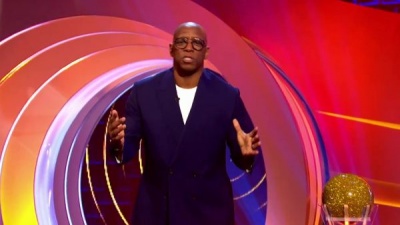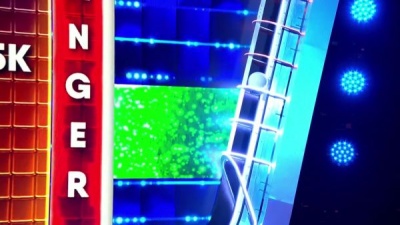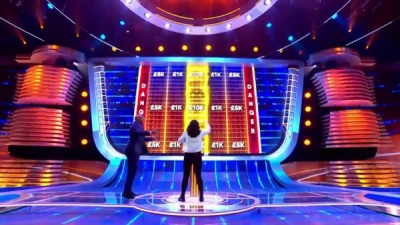Moneyball
(→Synopsis: add) |
(→Synopsis: oops) |
||
| Line 35: | Line 35: | ||
Then there's a countdown, 3 – 2 – 1, and the ball's released. We see it roll along the bottom, and part-way up the other side. Eventually, the ball will stop on the bottom rail. | Then there's a countdown, 3 – 2 – 1, and the ball's released. We see it roll along the bottom, and part-way up the other side. Eventually, the ball will stop on the bottom rail. | ||
| - | Above this bottom rail are various zones with sums of money, ranging from £1000 to the board maximum; in the first series, this increased in steps from £10,000 to £50,000 then a full £100,000, while in the second series, these started at £5,000, and the penultimate value was £75,000. Whichever zone contains most of the ball when it stops, that's the prize the player will win. There are also "Danger" zones indicated on the board, land in one of these and play another Danger Board. | + | Above this bottom rail are various zones with sums of money, ranging from £1000 to the board maximum; in the first series, this increased in steps from £10,000 to £50,000 then a full £100,000, while in the second series, these started at £5,000, skipped £30,000, and the penultimate value was £75,000. Whichever zone contains most of the ball when it stops, that's the prize the player will win. There are also "Danger" zones indicated on the board, land in one of these and play another Danger Board. |
<div class=image> | <div class=image> | ||
Revision as of 23:53, 30 July 2023
Synopsis
The one with Ian Wright and the rolling ball. The basic idea is to roll a ball forwards and backwards along a track. Where it comes to rest is how much it's worth.
Our contestant (pair from series two) walks out onto set, full of confidence and bravado. A gentle and friendly chat with Ian Wright settles any nerves, and then we're into the game proper.
A fairly simple general knowledge question, matching three items to three possible answers. One item per answer. Get the question right and the player earns a ball. (Get it wrong, and the player faces a Danger Board, with the prospect of leaving the game at once.)
Our player bangs their button to stop a graphic climbing up the wall, and the silver ball is elevated so that the bottom of the ball is at the line shown.
Then there's a countdown, 3 – 2 – 1, and the ball's released. We see it roll along the bottom, and part-way up the other side. Eventually, the ball will stop on the bottom rail.
Above this bottom rail are various zones with sums of money, ranging from £1000 to the board maximum; in the first series, this increased in steps from £10,000 to £50,000 then a full £100,000, while in the second series, these started at £5,000, skipped £30,000, and the penultimate value was £75,000. Whichever zone contains most of the ball when it stops, that's the prize the player will win. There are also "Danger" zones indicated on the board, land in one of these and play another Danger Board.
Our contestant has a choice. They can play on for the next board, or they can stop and try to cash out. To win the money, it's one final roll, one final board, with about 60% of the board marked as a win, and 40% as a flat loss. All or nothing, hit or miss.
The player has one lifeline: if they're stuck on a question, they can use a "Question Ball". It works like any other ball on the show, raise it up to release it. Whichever answer it lands on is marked as right or wrong. Just one of these "Question Ball" opportunities in the game.
Although Moneyball offers a theoretical top prize of £250,000, most contestants are happy to cash out at £30,000 or so.
The set is lit in a dark red, with orange accents and a neutral blue background: it looks very good on screen, as if it's gently burning in the background.
Each show contains three or four full games, lots of people have the chance to take home a very useful wodge of cash. It gets very repetitive, and quickly shows just how little there is to Moneyball. Answer some simple questions. Stop a launcher, bank some money, and potentially win it. It's more luck than judgement, and shows based on pure luck have never lasted long.
Catchphrases
"It's one shot to win the lot", said just before the contestant tries to cash out. This may be a vestige of the show's working title, The Money Shot, which was changed because of a smutty meaning.
Title music
Paul Farrer. Being a completist, he's scored each individual roll separately, and the programme gains from such attention to detail.
Trivia
A filming session in March 2021 had to be cancelled due to the cannon refusing to fire having previously refused to fire in rehearsals, and had to be delayed to September 2021.
Web links
See also
Weaver's Week review, which compares Moneyball to other shows with moving parts.






